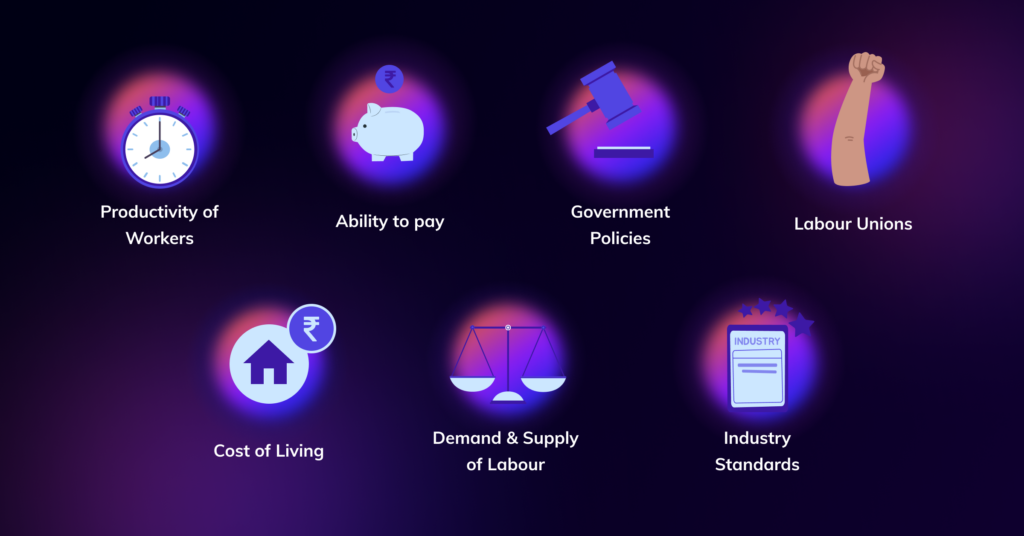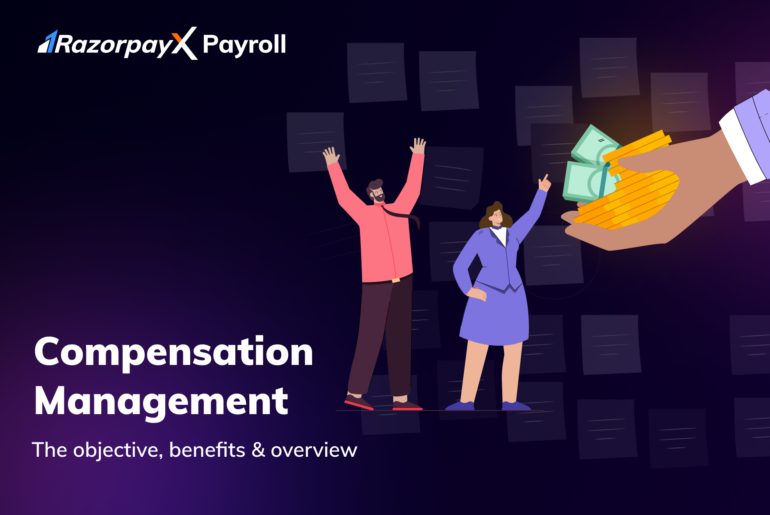Compensation management is one of the primary functions of HR, as it plays a crucial role in attracting and retaining top talent.
Table of Contents
What is compensation management?
It is managing and determining an employer’s compensation to the employees in return for their work.
Compensation management involves managing, analysing, and determining the salary, benefits, and incentives paid to the employees. Compensation management plays a crucial role in attracting and retaining top talent. It includes monetary as well as non-monetary benefits. It also increases employee productivity and reduces employee turnover.
Additionally, it ensures that every employee gets paid a fair wage based on industry standards, work experience, company budget, etc.
Key factors affecting compensation management
Here’s a list of key factors that affect compensation management. We have discussed each factor in detail in the next section.
- Productivity of workers
- Ability to pay
- Government policies
- Labour unions
- Cost of living
- Demand and supply of labour
- Industry standards

- Productivity of workers– Productivity-based compensation helps derive the best results. The higher the productivity of employees, the more should be the compensation.
- Ability to pay– If your company has high profitability, you can pay better compensation and retain your employees and vice versa.
- Government Policies– Government also has certain policies to protect employee interests. The employer has to pay the employees as per governmental regulations and provide benefits such as PF, medical insurance, gratuity, and pension.
- Labour Unions– They also play an essential role in ensuring employees get a fair wage. They fight with the employers for the employee’s rights and wage revision.
- Cost of Living– Cost of living also influences compensation to a large extent. An employee based in a city with a high cost of living needs a higher salary and vice versa.
- Demand and Supply of Labour– It is one of the most important factors that affect the compensation of employees. If the demand is more than the supply, the compensation will be higher.
- Industry Standards– No employee would like to join a company whose compensation is below the industry standards. Therefore you need to analyse the standard market rates of different roles and pay your employees accordingly.
Different types of compensation
The types of compensation are broadly classified into direct compensation and indirect compensation. Let us look at them in detail.
Direct Compensation
It is the monetary benefits provided by the employer to the employees.
- Hourly pay– Hourly pay is the salary paid for each hour of work that the employee does.
- Salary– Salary is the fixed monthly amount that the employer pays to the employee in cash.
- Commission– A monetary reward that is paid based on the performance of an individual. It is generally provided in the case of sales jobs as a fixed percentage.
- Bonus– A bonus is a monetary incentive paid to employees for their good performance. It is paid over and above the employee’s basic salary.
[Suggested Read: Salary Breakup – Salary Structure, Format, Calculation & More]
Indirect Compensation
Indirect compensation refers to non-monetary benefits like paid holidays, insurance, and retirement benefits.
- Insurance– Employers generally provide employees with medical insurance to ensure good health of their employees. If you are an early-stage startup facing difficulties getting employee insurance, check out RazorpayX Payroll. It provides group insurance packages to teams as small as 2!
- Paid holidays– Paid holidays are provided to help employees maintain a work-life balance.
- ESOPs– Sometimes, companies also provide their employees with their shares at a discounted price, offering them an additional opportunity to earn.
[Suggested Read: The Complete Guide to ESOPs (Employee Stock Ownership Plans)]
- Retirement Benefits– Retirement benefits include gratuity, pension, general provident fund, leave encashment, etc.
- Leave travel allowance– LTA or leave travel allowance is the non-monetary benefit provided by the employer to the employee where the employer covers the employee’s travel expenses.
- Relocation expenses– Relocation expenses are the benefits the employer provides in case the job requires relocation to a different city.
Importance of compensation management for HR Leaders
While the list of reasons why you should focus on compensation management is rather long, here are a few main reasons-
- Helps Plan Your Budget– Employee salaries are the highest cost for any startup. Compensation management helps determine the costs beforehand and plan the budget accordingly. It also helps plan increments and other benefits based on industry standards.
- Helps Motivate Employees- Compensation is the key factor influencing an employee’s productivity. A well-paid employee is more likely to work hard for your company and vice versa.
- Reduces Employee Turnover– Giving adequate monetary and non-monetary benefits helps increase job satisfaction and reduce the rate of employee turnover.
- Attracts Best Talent– It not only prevents employees from switching jobs but also helps attract top talent. The best talent always looks for a company with a competitive salary and benefits like insurance, paid time off, leave allowance, flexible benefits, etc.
The huge number of employees makes manual compensation management tiresome and error-prone. The best way to deal with the payroll of a huge number of employees is to use payroll processing software like RazorpayX Payroll.
Try RazorpayX Payroll for free!
How is compensation management determined?
In India, compensation determination involves a combination of factors, including market practices, legal regulations, industry standards, and individual performance:
- Job role and responsibilities
- Industry and market trends
- Geographical location
- Company size and financial health
- Experience and expertise
- Education and qualifications
- Performance and contributions
- Legal and regulatory factors (mentioned in the above sections)
- Gender equality and non-discrimination
- Collective bargaining and industry standards
- Benefits and perks
- Inflation and economic conditions
Things to be considered by HR Leaders to ensure effective compensation management
- Market Research: Conduct regular surveys and research to stay updated on industry compensation trends. This helps in ensuring your organization’s compensation packages remain competitive and relevant.
- Internal Equity: Ensure that compensation is fair and consistent within your organization. Employees performing similar roles should receive similar compensation, considering factors like experience, qualifications, and performance.
- External Competitiveness: Benchmark your organization’s compensation against similar roles in other companies to ensure your packages are competitive. Being under or over market rates can affect your ability to attract and retain talent.
- Total Rewards: Consider the entire compensation package, including base salary, bonuses, incentives, benefits, and perks. A well-rounded package can enhance the perceived value of compensation.
- Variable Pay and Performance Incentives: Incorporate performance-based pay to motivate employees and reward high performance. Define clear and measurable performance metrics linked to incentives.
- Transparency: Maintain transparency in compensation practices. Employees should understand how compensation decisions are made, including the criteria for raises, bonuses, and promotions.
- Job Evaluation and Grading: Implement a structured job evaluation system to assess the relative worth of different roles within the organization. This helps in setting compensation levels based on job responsibilities and requirements.
- Legal Compliance: Stay informed about labor laws, minimum wage regulations, and equal pay laws in your jurisdiction. Ensure that your compensation practices adhere to these laws to avoid legal issues.
- Communication: Clearly communicate compensation structures, policies, and changes to employees. This reduces misunderstandings and helps employees appreciate the value of their compensation.
- Flexibility: Consider offering flexible compensation options, such as flexible work arrangements, stock options, or cafeteria-style benefits. This caters to diverse employee preferences and needs.
- Budget Alignment: Ensure that your compensation practices align with the organization’s budget and financial goals. Overcommitting to compensation can strain financial resources.
- Regular Reviews: Periodically review and adjust compensation structures to account for inflation, changes in market conditions, and organizational growth. This prevents compensation from becoming outdated.
- Equity and Inclusion: Be mindful of potential biases in compensation decisions. Regularly review compensation data to ensure there are no disparities based on gender, ethnicity, or other factors.
- Employee Feedback: Seek input from employees about their compensation preferences and concerns. This can provide valuable insights for refining compensation strategies.
- Training and Development: Offer training to HR personnel involved in compensation management to ensure they have a deep understanding of the factors that influence compensation decisions.
- Retention Strategy: Use compensation strategically to retain top performers and key talent. Identify critical roles and individuals who contribute significantly to the organization’s success.
- Performance Evaluation: Establish a robust performance evaluation process that ties compensation decisions to objective performance metrics, fostering a merit-based culture.
Benefits of Compensation Management
For Organizations
- Attracts and retains top talent
- Motivates performance and productivity
- Increases employee satisfaction and engagement
- Aligns with business objectives
- Drives better organizational performance
- Encourages talent development
- Retains key employees
- Enhances cost efficiency
- Mitigates compliance and legal risks
- Builds a positive employer brand
For Employees:
- Ensures fairness in rewards
- Motivates through performance-based pay
- Provides recognition for achievements
- Supports financial security
- Boosts job satisfaction
- Increases retention rates
- Promotes professional growth
- Ensures equity in compensation
- Improves work-life balance
- Fosters long-term commitment
Compensation Management Software – RazorpayX Payroll
RazorpayX Payroll is India’s ONLY fully automated compensation management and payroll software. Here’s how RazorpayX Payroll benefits you-
- Helps manage employees from onboarding to exit
- Auto calculates deductions like PF, ESI, and TDS and files them
- One-click payment of employee salaries
- Provides best-in-class yet affordable health insurance
- Leave tracking along with real-time attendance
- HR management software to access payslips, form 16s, etc.
Automate compensation management
Read more:





